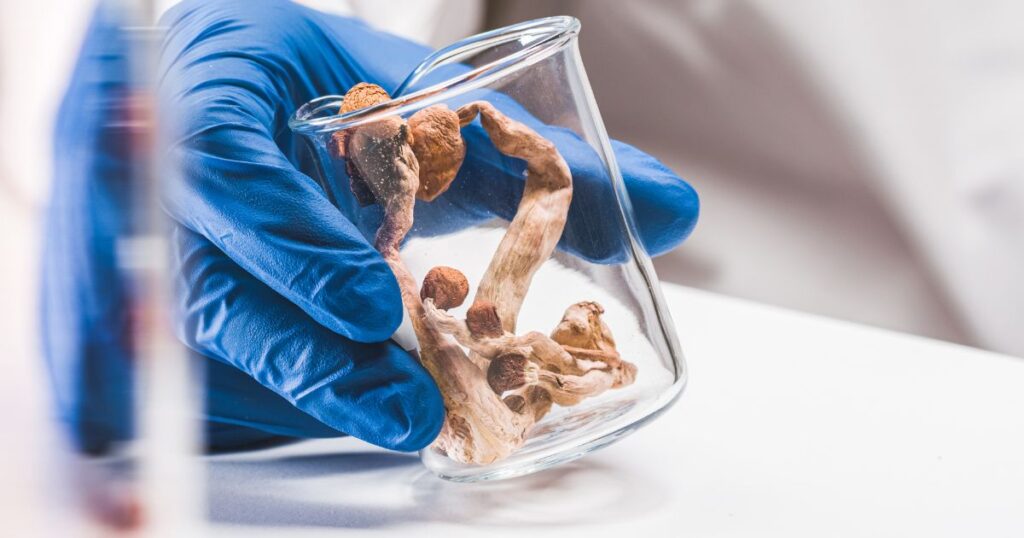The landscape of psychedelic medicine has reached a huge moment in time. The Drug Enforcement Administration (DEA) has formally requested that the U.S. Department of Health and Human Services (HHS) conduct a medical scientific review on psilocybin, marking a significant step toward potential rescheduling.
This development, first reported by Marijuana Moment, represents years of legal advocacy and could fundamentally change how we approach mental health treatment and end-of-life care.
This milestone comes after an intensive legal challenge led by Washington State-based doctor Sunil Aggarwal, who has fought for years to access psilocybin for his terminally ill patients. The DEA’s transmittal to HHS signals a dramatic shift from their initial denial of the rescheduling petition.
The implications extend far beyond administrative procedure. Should HHS recommend moving psilocybin from Schedule I to Schedule II of the Controlled Substances Act, it would unlock unprecedented research opportunities and provide legal pathways for patients who desperately need these treatments.
Veterans struggling with PTSD, terminal cancer patients facing end-of-life anxiety, and countless others suffering from treatment-resistant mental health conditions could finally access therapies that have shown remarkable promise in clinical settings.
Breaking Down Barriers to Life-Saving Medicine
The current scheduling system has created artificial barriers that have prevented researchers from fully exploring psilocybin’s therapeutic potential. Schedule I classification requires researchers to navigate an labyrinth of regulations, making studies expensive, time-consuming, and often impossible to conduct. This maze has slowed progress on treatments that could alleviate tremendous suffering.
Since 2020, Dr. Aggarwal has pursued every legal avenue to provide psilocybin-assisted therapy to his palliative care patients. His work through the Advanced Integrated Medical Science (AIMS) Institute represents more than academic curiosity—it reflects a physician’s commitment to reducing suffering when conventional treatments fall short.
The legal battle has been complex and challenging. Initially, the U.S. Court of Appeals for the Ninth Circuit ruled against Aggarwal’s arguments in February, though an earlier October ruling technically went against the DEA.
The Science Behind the Breakthrough
FDA’s previous designation of psilocybin as a “breakthrough therapy” provides substantial foundation for the current review. This designation is reserved for treatments that show substantial improvement over existing options for serious conditions.
Multiple clinical trials have demonstrated psilocybin’s effectiveness in treating depression, PTSD, and end-of-life psychological distress.
Research institutions across the globe have produced compelling evidence of psilocybin’s therapeutic benefits. Studies show that single sessions of psilocybin-assisted therapy can produce lasting improvements in depression and anxiety, often exceeding the effectiveness of traditional pharmaceuticals.
These findings aren’t marginal improvements—they represent potentially transformative treatment options.
The neurobiological mechanisms behind psilocybin’s effects are becoming clearer as research advances. The compound appears to promote neuroplasticity, allowing the brain to form new neural connections and break out of rigid patterns associated with depression and anxiety. This neuroplasticity may explain why single treatments can produce enduring benefits.
A Cultural Shift in Psychedelic Acceptance
The DEA’s decision highlights the larger cultural changes in how society views psychedelics these days. These substances are no longer relegated to counterculture movements or dismissed as recreational drugs without medical value.
Mainstream medical institutions, prestigious universities, and respected researchers have embraced psychedelic research as a legitimate field of study.
This transformation represents a maturation in our understanding of consciousness, mental health, and therapeutic intervention. Psilocybin, MDMA, LSD, and other psychedelics are being recognized as powerful tools that could revolutionize psychiatric treatment.
The stigma that once surrounded these substances is giving way to scientific curiosity and therapeutic promise.
Cannabis legalization has also paved the way for this larger acceptance as well. As states have implemented medical and recreational cannabis programs, public opinion has shifted toward viewing plant-based medicines as viable treatment options.
This cultural change has created space for serious discussions about other “controlled substances” that may have therapeutic value.
Implications of Psilocybin Rescheduling for Patients and Providers
Should the rescheduling succeed, the immediate beneficiaries will be patients with limited treatment options. Terminal cancer patients experiencing existential distress could access psilocybin therapy to find peace and meaning in their final months.
Veterans with treatment-resistant PTSD could participate in supervised sessions that address trauma in ways traditional therapy cannot achieve.
Healthcare providers would gain access to training programs and standardized protocols for psilocybin-assisted therapy. This would ensure safe, effective treatment while maintaining appropriate medical oversight.
The therapy model typically involves preparation sessions, a guided psilocybin experience with trained facilitators, and integration sessions to process insights and changes.
Right-to-try laws could provide immediate access pathways for qualifying patients. These laws allow terminally ill patients to access experimental treatments that haven’t completed the full FDA approval process. However, Schedule I restrictions have prevented right-to-try access to psychedelics, creating a catch-22 for desperate patients.
Research Renaissance on the Horizon
Rescheduling would unleash a renaissance in psychedelic research. Universities could establish dedicated research centers focused on understanding how these compounds work and optimizing their therapeutic applications. Pharmaceutical companies could invest in developing standardized formulations and delivery methods.
The research possibilities extend beyond mental health applications. Scientists are investigating psilocybin’s potential for treating addiction, chronic pain, and neurological conditions.
Early studies suggest these compounds might help with cluster headaches, obsessive-compulsive disorder, and even certain neurodegenerative diseases.
Regulatory Challenges Ahead for Potential Psilocybin Rescheduling
The path forward isn’t without obstacles. HHS must conduct a thorough scientific review that considers safety profiles, abuse potential, and medical utility. This process could take months or even years, depending on the depth of analysis required and political considerations.
Opposition from certain quarters remains strong. Some law enforcement agencies worry about increased access leading to recreational misuse.
Conservative politicians may resist changes to drug scheduling based on ideological opposition to drug policy reform. These concerns will need to be addressed through careful regulation and public education.
Training and oversight systems must be developed to ensure safe implementation. Psilocybin therapy requires specialized training for providers and carefully controlled treatment environments.
Unlike prescribing traditional medications, psychedelic therapy involves intensive preparation and integration work that demands new clinical protocols.
The Bigger Picture for Drug Policy Reform
This development is also just more than progress for psilocybin specifically—it signals an evolution in drug policy thinking. For too long, American drug policy has been driven by criminalization rather than public health considerations. The scientific method is finally being allowed to guide policy decisions about controlled substances.
MDMA-assisted therapy for PTSD may be next in line for regulatory reconsideration. Clinical trials have shown remarkable success rates for this treatment approach, and advocates are building similar legal challenges to expand access. The precedent set by psilocybin rescheduling could accelerate progress for other psychedelics.
Cannabis rescheduling efforts may also benefit from this precedent. As the Trump administration continues to consider moving cannabis to Schedule III, the psilocybin case demonstrates that medical evidence can overcome decades of prohibition-based policy. Both substances have been victimized by political rather than scientific scheduling decisions.
As HHS begins its review, the scientific community awaits the opportunity to fully explore psilocybin’s therapeutic potential. Patients, providers, and researchers share hope that evidence-based medicine will prevail over outdated prohibition policies. The barriers that have prevented access to potentially life-saving treatments may finally be coming down.
The days of dismissing psychedelics as dangerous drugs without medical value are ending. Science is revealing their remarkable therapeutic potential, and policy is slowly catching up with evidence.
This moment is more than regulatory change—it signals a fundamental shift toward compassion, healing, and evidence-based healthcare for all Americans who need it.
















